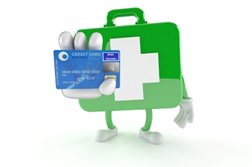It’s no secret that health care costs are higher than they have ever been – and if you need a medical or dental procedure that your insurance doesn’t cover, you can really have an expensive (and painful) dilemma on your hands. You might have to come up with several hundred or even several thousand dollars to pay out of pocket. And that might make many people think twice about whether they need the procedure – a sometimes dangerous decision to have to make.
Fortunately, there are various payment options for expensive health care expenses that insurance won’t pay for. You could choose to:
Put the expense on an existing credit card. However, if that bumps your credit card balance too close to your credit limit, that will hurt your credit score. If you do pay your medical, dental or hospital bill with a credit card you already have, make sure to pay that card’s balance back down as soon as possible. The good news is that if you send in more than the monthly minimum to get that balance back down, this kind of activity can actually end up improving your credit score because it shows you to be responsible with your debt management.
Ask for an extended payment plan. Some doctors and dentists will allow you to use an extended payment plan without involving any credit companies, so you can ask if that is an option in your case. After all, it’s in the health care provider’s best interest to keep you as a patient – especially if you’ve been using their practice for some time already.
Apply for a health care credit card. This is a fairly new option, but one that’s catching on in popularity – and these cards are offered by major credit issuers such as Citi, GE Money, Chase and more.
Health care credit card accounts have similar terms to the kind of credit accounts home repair contractors offer: zero interest as long as you pay off the balance within a set amount of time, and as long as you make the monthly payments on time. So even if your health care provider doesn’t allow an extended payment plan, these credit cards give you a way to spread your payments over time without maxing out your other credit cards.
However, if you don’t pay off that balance in the allotted time – or if you miss a payment or fall behind on your payments – a high interest rate will apply. But for responsible borrowers that are able to make the required payments on time, a health care credit card can be a great way to get the medical or dental procedures you need without having to pay any interest.
Whichever option you choose, don’t let the high cost of health care keep you from getting the dental or medical care you require. Ask your physician or dentist about health care credit cards and other payment options so you can get back on the road to good health.








Leave a Comment